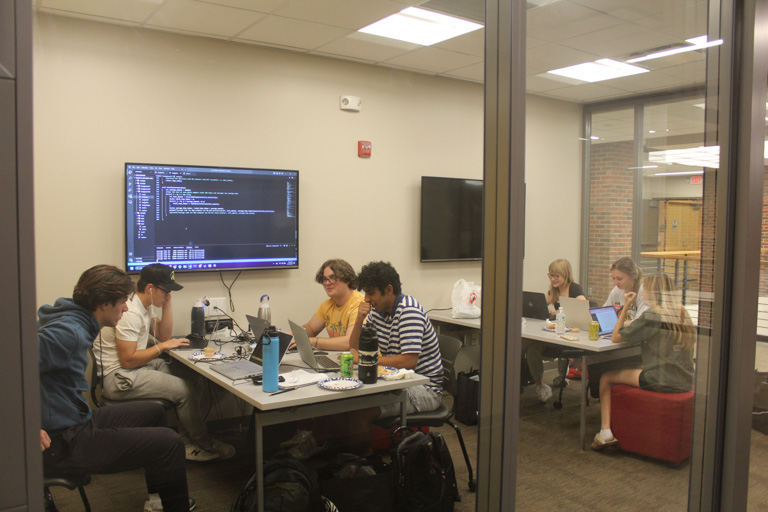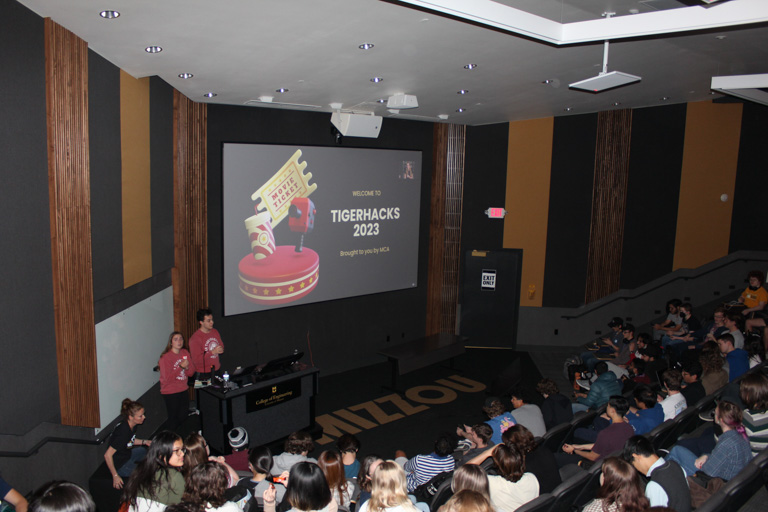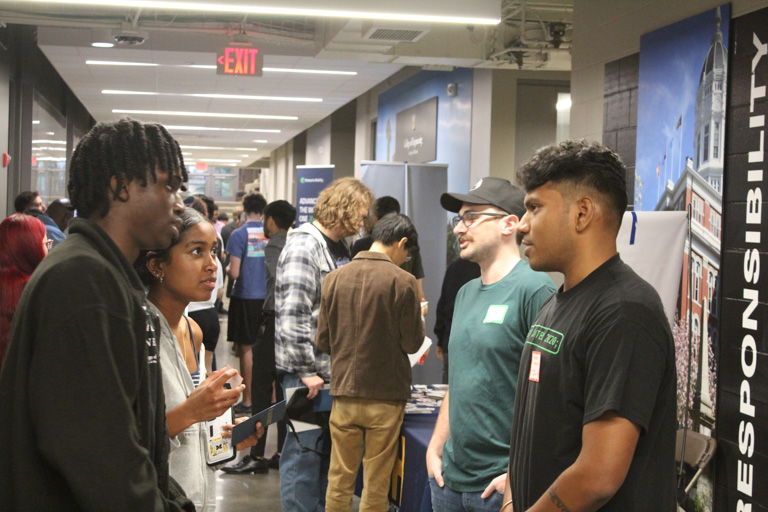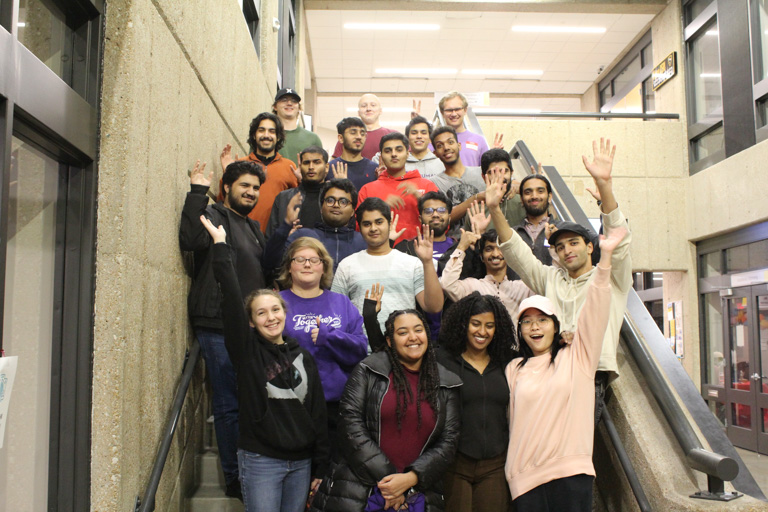October 29, 2024

This weekend, Mizzou Engineering will be packed with future computer programmers around the clock for TigerHacks, the largest student-run hackathon in Missouri. For 36 hours, students will put their brains together to develop anything they’re interested in around the theme of Food and Agriculture in hopes of winning part of the competition’s $7,500 prize pool.
TigerHacks will be hosted at Lafferre Hall, with check-in opening at 5 p.m. on Friday, Nov. 1, and the Opening Ceremony beginning at 6 p.m. The 36-hour hackathon will run until 10 a.m. on Sunday, with judging to follow.
Computer science students Matt Marlow, Elise Fidler, Stella Craig and Jessica Xie sat down for an interview about TigerHacks 2024. Marlow is the principal director of TigerHacks, and Fidler, Craig and Xie are members of the marketing team.
First, can you provide some background information about TigerHacks?

Matt: TigerHacks is Missouri’s largest student-run hackathon. We invite students from around the region to build a software or computing project from scratch. Participants get their friends to build a team of up to four or they can match with a team at the event. Then, they come up with an idea based on our theme—which this year is Food and Agriculture—and they can build a game, website or whatever they want. It’s a great way for people to learn new skills.
We are working with MUVR on campus to host a VR hackathon within the event for participants to submit mixed-reality projects. We’re also working with MU Robotics and MU 3D Printing Club to offer a hardware hack if students want to work with their hands and work with some more embedded electronics.
Why do you host TigerHacks?
Matt: I think of TigerHacks as being a celebration of computing. At the College of Engineering, we try to incorporate as many of our computing organizations as possible, and it’s a culmination of a lot of very hard-working students’ work.
It also provides an opportunity to gain experience and hone some practical skills you wouldn’t often do in a classroom. Especially if you’re a freshman, not many courses are going to be project-based. We do this to give people an opportunity to pick up something new, look at a problem in a completely different way, or even just explore new problems that they wouldn’t get the opportunity for.
Stella: It also adds to your resume and is a great opportunity to network. I know every job I’ve applied for, they’ve all asked me to tell them about TigerHacks.
Jessica: Absolutely, I did it as a freshman, and it was like the first opportunity for me to work in a team, on a project that you can actually see and visualize for yourself, which is cool. And then adding a project onto your resume early was nice.
Who can compete in TigerHacks?
Jessica: All undergraduates are invited to compete, from any major or college, and not even just from Mizzou. We’ve had participants from Missouri S&T, College of the Ozarks, Truman and Wash U.
Matt: We’ll have two tracks. The beginner track is for first-year students and those from non-computing majors at the university. The developer track is going to be for our more experienced students, whether they’ve had an internship or are a sophomore, junior or senior with a couple of years of programming.

What goes on at TigerHacks?
Stella: We have activities throughout but a lot of them are optional. So, if want to learn more about certain skills, or take part in a team-building exercise, you can. Or you can just decide to stay in your little pod and keep working on your project instead.
Matt: I think people really like the Career Fair. We invite sponsors that do computer science to come and table at the event. It’s a really good way to network and talk to employers and you have a lot more time to make more interpersonal connections specific to computer science. We’ve even had sponsors schedule interviews and hire people from TigerHacks during that weekend.
We are also going to have a web development workshop during the event and we’re working to get other professors to offer workshops for students. We previously have offered workshops on Unity.
Jessica. I also love the opening ceremony, it just gets you so hyped up. It’s so exciting. You get to know more about all the different opportunities you have. It’s a lot of fun.
What was your favorite TigerHacks project that you developed?
Stella: I participated last year in the game category. We wanted to make a game because we didn’t have a lot of experience with making games, and we used the Godot engine. Last year’s theme was media, so we made a platformer where each level was a different era of film.
Matt: My first year, my friend and I wanted to learn Unity, the game engine, so we got a study room and built this space puzzle game. It was, in the best way possible, a complete disaster, but I think back on it with a lot of love and pride. We learned a lot of new things.
How is judging different this year?
Matt: In response to feedback we’ve gotten over the years, we’re revamping our judging process. We’re going to do a science fair approach, where we’re going to have people in a room, and they will get about 10 minutes to present their project to two judges. The judges will actually interact with each project and participants will be a lot more informed of how well they did. We also don’t want people to have to do a very formal presentation, so that time is completely up to you to decide how to demo your project.

What is your best advice for students coming to TigerHacks?
Matt: Don’t come in thinking that you’re going to fail. I think a lot of first-year students come into it and they’re like, “We’re a freshman, we don’t know what we’re doing, we’re not going to succeed.” And that’s not at all true.
It’s a great way to really challenge yourself and learn some new things. So even if you only learn C, don’t worry about it. Pick a game engine that you’re really interested in learning about, pick a programming language that sounds interesting to you, and just try to make something with it.
Stella: My advice is almost the opposite. Don’t come in with the intention of winning. Come in with the intention of having fun and being able to create something fun that you’re proud of and excited about.
Jessica: Don’t be afraid of just trying it out, or of not having a functional product at the end. There are going to be workshops and people will be able to help you. We will have mentors from different companies as well as professors. So don’t be afraid to reach out for help, because people want to help you and they want you to succeed and during the event.
Elise: Have fun. I mean, you’re going to spend a weekend getting to do a bunch of nerdy stuff with a bunch of nerdy people. It’s a good time. It’s supposed to be a fun way to get to learn something new. So, take advantage of that.
Is there anything else you’d like to add?
Elise: I really want to emphasize to just do it, even if you think you can’t do it. I really regret not doing it my first year. I’m glad to have this other way of participating by being on the committee, but if I could go back in time, I’d tell myself, “Who cares that you suck at this? Just do it. It’s fun, and if you’re bad at programming now, you’re going to get better when you spend 36 hours doing it.”
Matt: I personally want to give a special shout out to the entire committee. Every single one of the committee members has worked really hard to bring this event to life, it would not have been possible without them. Reach out to us if you’re interested in joining!